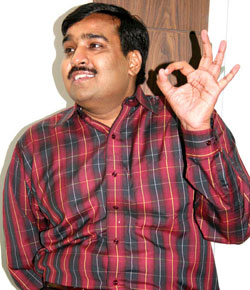Product Nation interviewed Dr. Ajay Data, Founder and CEO of Data Infosys. In this freewheeling chat, Dr. Ajay discusses his journey of creating a world class product for the masses, and his key focus areas as he built and scaled his organization from scratch. Read on…
Your company, Data Infosys, in a fairly short span of 15 years has managed to emerge as India’s leading ISP as well as the #1 communications product provider. Can you describe how all of this started?
 I hail from a business family whose interests were primarily in ceramics and edible oil. Like many other business persons in India, I too involved myself in family business and was well on path to take it to the next level. During 1998, I began to notice the initial signs of Indian government’s intent in allowing Internet usage for its people. Having read about the disruptive nature of internet and its advantages in the west, I always had kept tab on the developments on that front. So, when Satyam, the key ISP at that time issued an advertisement for partnership, I immediately jumped on this and initiated discussions with them.
I hail from a business family whose interests were primarily in ceramics and edible oil. Like many other business persons in India, I too involved myself in family business and was well on path to take it to the next level. During 1998, I began to notice the initial signs of Indian government’s intent in allowing Internet usage for its people. Having read about the disruptive nature of internet and its advantages in the west, I always had kept tab on the developments on that front. So, when Satyam, the key ISP at that time issued an advertisement for partnership, I immediately jumped on this and initiated discussions with them.
During the course of discussions with them, it became clear to me that those folks were being very unreasonable in their terms. I did some more background work to examine the feasibility of becoming an Internet Service Provider – and initial evaluation suggested that while the path to do it alone was very difficult, the returns would be lucrative if one did it. Hence, I chose not to partner with them, but instead compete with them. This led to creation of Data Infosys, primarily with the aim to be the Internet Service Provider of choice targeting audience from North India to begin with.
Deciding to foray into a new business, of which you had little knowledge, is extremely risky and outcomes are uncertain. How did you navigate around these challenges in the initial years?
Starting any new business will bring with it its own risks and uncertainties. In my case, I had no knowledge of dealing with servers, hardware, no proper mentor or guide to work on the domain specific aspects. I think I overcame these challenges due to two aspects. The first one – is to get your hands dirty and learn the nuts and bolts of the business yourself. This meant that I learnt how to install a modem at a customer’s place, how to plan, set up and run a call center, how to order, procure and deploy a server, configure a router etc all by myself. Once you got a grasp of the basics of the business activities, it is easier to plan and track the activities.
Secondly, my approach was to plan and execute short set of activities as quickly as possible. I failed many times trying different approaches to meet an end goal. However, since I failed early, every next attempt – I knew what not to do. Both of these helped me develop the required expertise and knowledge of the business very quickly.
While the learning may have been quick and useful, how and when did the actual validation come that your business was in the right direction?
In 1999 I planned to invest about Rs. 40 lakh as the first iteration on the infrastructure to provide ISP services. To test the receptivity of customers, I placed an advertisement in a local news paper about offering our service. The next day, I saw 200 people queued up in front of my office, even when I had not started to execute on my plan. This was good enough indication that I was doing the right thing at the right time. All that was necessary was for us to execute on our plan – and we did it well.
How did the company’s transformation to products happen? What were the key drivers?
The focus on building products got amplified due to market conditions that developed in 2001. Due to increased attention on the ISP business, there was lot more competition in the market – and prices for a new internet connection drastically fell from about Rs. 2700 to Rs. 800 almost overnight. This sharp fall triggered the need to look for ways in which we could retain our customer base and provide them more value. We decided to shift gears and develop an IP based portfolio that would help us sustain and monetize our existing customer base.
It was at this time, we discovered that among our 1 lakh user base, a lot of them were dissatisfied with the email service provided by the ISP. This led us to design and develop Xgen, initially using the LAMP stack. We offered this service to our customer base. The customers provided valuable feedback on various aspects of our product – which we quickly addressed. This ensured that we built this product, ground up based on customer requirements.
The email / communication / collaboration product is not very new to market. Also, there are existing MNC giants in this space who dominate the market. Despite this, how were you able to sustain your product offering and emerge successful?
It is obviously not easy to enter into a mature market. However, to our advantage, we had an initial customer base from our ISP services that we could start with. Their feedback helped in developing the product specific to the unique and unmet needs of the customers that were hitherto ignored by the existing vendors. While there were MNC products already in the market, we were able to execute faster than them to capture the growing base of new customers who got added to the ecosystem. Several differentiating features such as superior processing of data, optimal transmission of data over the wire helped us differentiate from competition.
For example, among our recent wins at India’s leading PSU, the customer wanted to test the ability of all the short-listed vendors to send and receive an email with a 100 MB attachment. We came up trumps and bet the competition hands down all aspects of their evaluation such as speed of handling the traffic and delivery, transmission of data from two separate physical points in least amount of time, bandwidth consumed while transmission etc. So, in summary, our ability to understand the latent communication requirements of our prospective customers, the robustness and scalability of the technical architecture we have built in our product, coupled with superior round the clock support has enabled us to become the leader in this space in our country. I feel proud to state that we have gone from zero to 9 million customers in a span of 10 years for this product!
A quick look at your customers reveals that you have a lot of government departments as your customers. A lot of people find it difficult to work with this sector. Can you share with us how you have succeeded in building such good relations with them?
At the highest level, I do not differentiate between any customers based on the sector. It is my belief that as long as you can deliver value and solve their issues, you can acquire customers in any sector. Talking specifically of the government sector, you need to understand not just the end goal that they are trying to achieve, but the mechanics of getting there – within the framework of the government rules. As with any other sector, the decision makers and the workforce using the product will have their specific challenges. One needs to understand the limitations and propose a solution that alleviates their pain points in a way that is win-win to both the parties. Constant engagement, superior support is two aspects that one needs to focus on while dealing with this sector.
Once you have succeeded in demonstrating your product capabilities and the value to the department, word spreads by itself about our product and service, and a lot more doors will open up. This is how we have managed to build and develop long lasting relationships with the government customers.
On a parting note, what are the key tips that you wish to share with fellow entrepreneurs?
I believe that we have a very big opportunity in India to develop innovative products. Looking back at my initial years, I recollect that I have spent sleepless nights attending to the needs of the business – purely because I was driven by the passion to deliver value to our customers. There have also been times where I had to engage with customers for years before they decided to choose our product. So, I urge all product entrepreneurs to follow their passion, persevere and never give up; do not hesitate to dream big. If you have the conviction and the ground intelligence about the market fitment of your offering, do not look back.
Secondly, do not let recognitions and accolades distract you from achieving better. These recognitions are good in that they are a validation of your success thus far. It helps to motivate you to do better. However, do not rest on these laurels, since a slight digression from your goals might mean you are out of the race.


